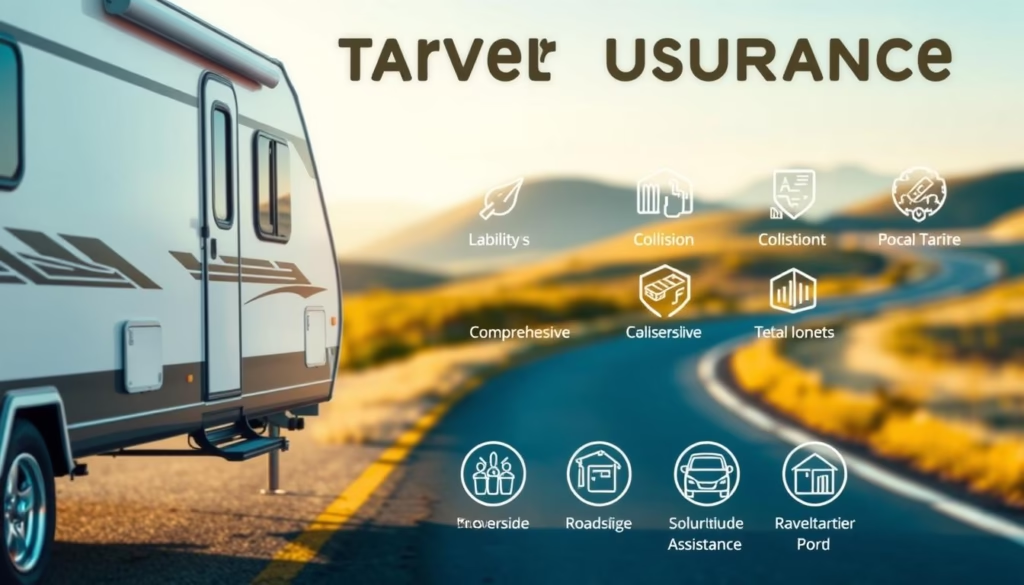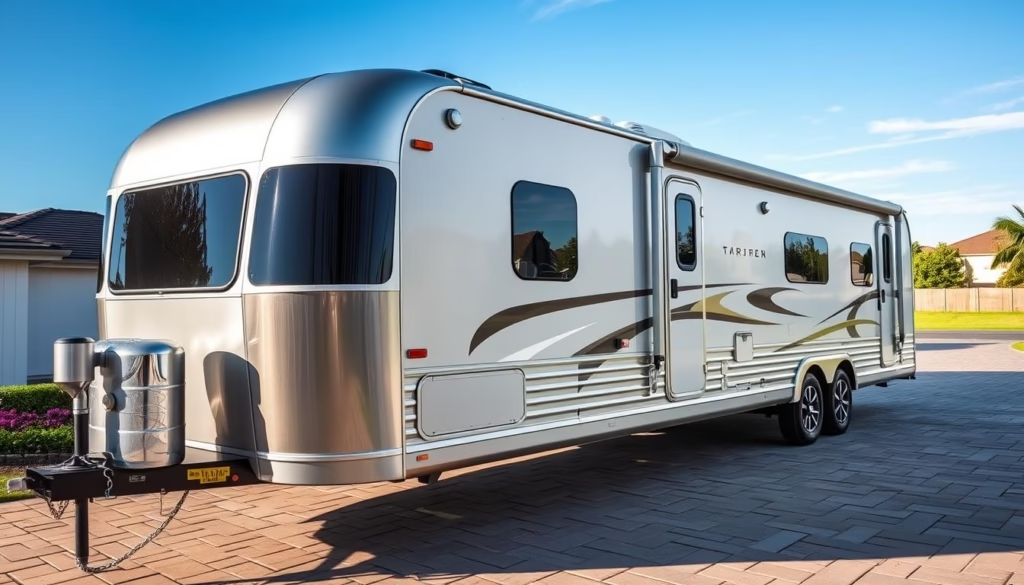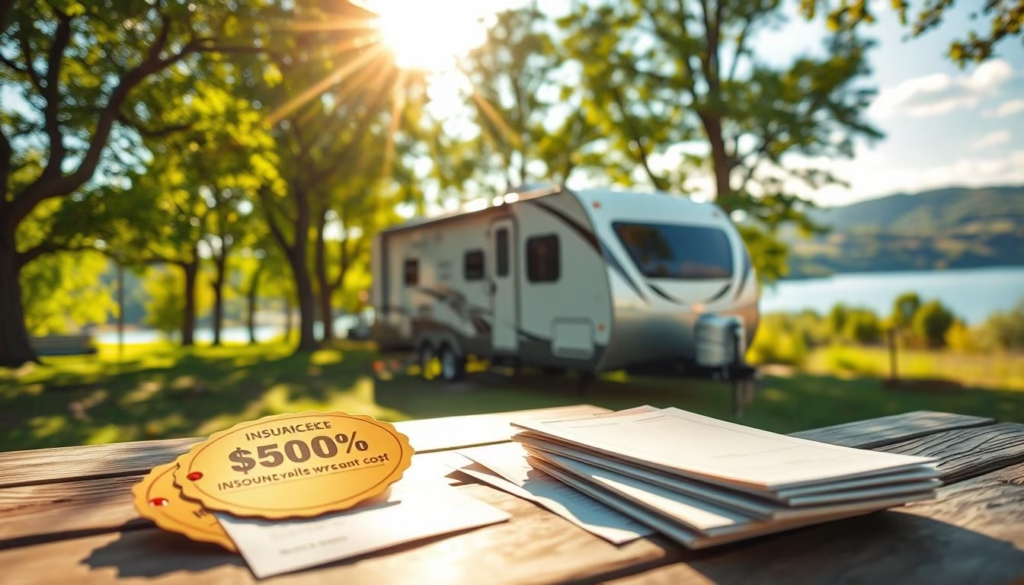Have you ever wondered whether your towed unit needs its own protection or if the tow vehicle will cover you?
Understanding coverage for a travel trailer matters if you tow a camper with a separate vehicle or drive a motorhome. A towed unit is treated differently from a motorhome, and that affects what a policy will pay for.
Specialized trailer policies focus on physical damage — comprehensive and collision — while the towing vehicle usually supplies liability. Lenders often require comprehensive and collision when a unit is financed, and options like total loss replacement, personal effects, and emergency expense coverage add tangible protection.
Later sections will show who needs which type, core coverages, cost drivers, discounts, and how to get a fast insurance quote. Comparing limits and deductibles helps you match a policy to how and where you store and use your unit.
Key Takeaways
- What is travel trailer insurance and who needs it?
- Insurance on travel trailers: core coverages and protection
- What trailer insurance typically covers versus your auto policy
- Requirements in the United States: what may be required and when
- Cost of travel trailer insurance and how pricing is determined
- Discounts and ways to save on your trailer insurance policy
- Get an insurance quote for your travel trailer
- Conclusion
- FAQ
- A towed travel trailer needs a trailer policy; a motorhome needs motorhome coverage.
- Liability usually follows the towing vehicle; trailer policies cover physical damage and belongings.
- Common coverages: comprehensive, collision, personal effects, and emergency expenses.
- Financed units often require comprehensive and collision from lenders.
- Get a quick quote and compare limits, deductibles, and optional protections for best value.
What is travel trailer insurance and who needs it?
A dedicated policy exists to protect a towed living unit from physical loss and campsite risks rather than to assign fault while driving.
Who should consider this protection? Owners who tow a camper for camping or long trips, those with financed units, or anyone who stores a unit in higher risk areas usually need extra coverage. Lenders often require damage protections when a lien exists.
Motorhome vs. travel trailer: what’s the difference?
A motorhome is a self‑propelled RV that typically must carry its own RV liability by state law. Liability for a towed unit usually flows from the towing vehicle, so the trailer gets a separate physical‑damage policy.
Types commonly insured
Insurers cover many types, and cover needs vary by use and size. Common examples include:
- Conventional travel trailers and small teardrops
- Fifth‑wheel units and pop‑up campers
- Toy haulers, truck campers, cargo or horse units, and overlanding rigs
How to decide: Match policy limits to your unit’s value, how often you camp, and where you store it. Also check the towing vehicle’s liability limits to ensure adequate protection while driving.
For a clear primer, read a detailed guide to travel trailer insurance.
Insurance on travel trailers: core coverages and protection
Choose coverages that handle sudden loss, repair costs, and campsite liability so a major incident doesn’t drain savings.

Comprehensive and collision for damage, theft, fire, and weather
Comprehensive pays for non‑collision perils such as theft, vandalism, hail, wind, fire, and many sudden water incidents. Typical exclusions include wear and tear and maintenance issues.
Collision covers crash damage — for example, backing into a post or a highway accident — after your deductible toward repair or replacement costs.
Total loss replacement and agreed value options
Total loss replacement often applies to newer units (commonly within five model years) and helps you get full replacement value. Older units usually use an agreed or specified value so settlement is predictable.
Personal effects replacement
Policies can reimburse personal belongings kept in the unit — electronics, outdoor gear, or cookware — up to chosen limits or replacement‑cost options.
Vacation/campsite liability and medical payments
Vacation or campsite liability responds if your parked unit causes injury or property damage. Optional medical payments help cover minor injuries without litigation.
Emergency expenses and roadside assistance
Emergency expenses cover temporary lodging and travel if a covered loss interrupts a trip. Roadside assistance adds tows, tire changes, and jump starts when problems occur on the road.
Tip: Lenders usually require both comprehensive and collision for financed units, and some carriers require comprehensive to bind a policy. Review limits and deductibles after upgrades or major changes, and check endorsements yearly.
For a deeper breakdown of what a typical RV policy covers, see this primer: what does RV insurance cover.
What trailer insurance typically covers versus your auto policy
Know which plan pays which loss before you hit the road or set up camp.
Division of responsibility: Your auto policy usually provides liability for bodily injury and property damage while you tow. The trailer policy focuses on physical damage to the trailer itself and optional campsite liability when parked.
When the towing vehicle’s liability applies
If you cause an accident while towing, the vehicle’s liability generally responds to third‑party injury and property claims, up to your policy limits.
“Always check your auto liability limits; state minimums may not cover towing exposures.”
Optional campsite or vacation liability on the trailer policy can fill gaps when the unit is used as a temporary residence. That helps if someone is hurt at your campsite.
| Loss Type | Typical Responsible Policy | Notes |
|---|---|---|
| Bodily injury to others while driving | Auto liability | Covered up to vehicle policy limits |
| Collision damage to trailer | Trailer collision/comprehensive | Subject to deductible; may cover theft and hail |
| Injury at campsite | Optional trailer campsite liability | Useful for parked‑unit exposures |
| Damage to accessories while towing | Varies by insurer | Confirm treatment of attached equipment |
Practical tips: Confirm how accessories and attached gear are treated. Coordinate claims if both the vehicle and trailer are damaged in one accident. Keep proof of coverage for both the vehicle and the trailer handy whenever you travel.
Requirements in the United States: what may be required and when
State rules and lender demands shape the minimum protections owners must carry.
State liability rules for motorhomes vs. towable trailers
Most states require liability for a motorhome because it is a driven vehicle. That liability covers bodily injury and property damage while operating the unit.
No state, in general, forces a separate trailer policy for a towed unit, though the towing vehicle’s liability usually applies while on the road.
Lender or lease requirements for comprehensive and collision
Lenders often may require comprehensive collision on financed or leased units to protect their collateral.
Check your loan or lease paperwork to confirm minimum limits and deductible rules before delivery or registration.
Full-time RV considerations
Owners using an RV as a primary residence for six months or more should consider broader options.
- Higher personal effects limits
- Personal liability and medical payments
- Loss assessment and extended living expense coverage
“Requirements differ from best practices; adequate protection still helps preserve savings and plans.”

| Situation | Typical Requirement | Who sets it |
|---|---|---|
| Driven motorhome | Liability minimums | State DMV / law |
| Financed towed unit | Comprehensive & collision | Lender / lienholder |
| Full-time residence | Expanded personal liability & living expense | Specialty policies / carriers |
Cost of travel trailer insurance and how pricing is determined
Understanding what drives price helps you get a fair quote and choose the right protections.
How much you pay each year depends on where you store the unit, how often you use it, and the model year. Insurers rate risk by garage location, local weather threats, and theft exposure.
Key rating factors
- Storage: indoor storage often lowers cost; outdoor and street parking raise it.
- Model and year: newer models have higher replacement values, which increases premiums.
- Usage days: policies with fewer rated days can be cheaper if you truly camp less.
- Driving history: claims or violations on the towing vehicle can push rates up.
Higher limits and broader coverage improve protection but usually increase the premium. Raising deductibles typically lowers the annual price.
Baseline: entry-level RV insurance can start near $125 per year, though actual cost varies by state, unit type, and chosen limits.
Review your plan every few years as the unit ages. Compare multiple policies and consider bundling and safe‑driver discounts to find the best balance of price and protection.
Discounts and ways to save on your trailer insurance policy
Save without cutting needed protection.
Common ways to reduce premiums
Good driver and defensive course credits reward safe behavior and can lower rates.
Multi-vehicle or multi-policy bundling yields steady discounts for combining auto and RV coverages.
Homeowner and military discounts often apply when eligibility is proven.
Paid-in-full or automatic payments may cut your bill more than splitting installments.
Safety and anti-theft savings
Secure storage, hitch locks, GPS tracking, and alarm systems reduce theft risk and help qualify for additional discount options.
Roadside assistance add-ons can be inexpensive and practical for trips without large premium increases.
“Ask insurers about state-specific credits and document upgrades to ensure you get every eligible reduction.”
| Discount Type | Typical Benefit | How to Qualify |
|---|---|---|
| Good driver | 5–25% off | Clean driving record |
| Bundle (multi-policy) | 10–20% off | Combine auto and RV lines |
| Anti-theft | 5–15% off | Install locks or tracking |
| Paid-in-full | Small percentage | One annual payment |

Get an insurance quote for your travel trailer
A fast, fair quote begins with basics: model year, VIN, storage ZIP, and how often you use it.
Info to gather before asking for a quote
- Year, make, and model (series or model number).
- VIN and purchase price — carriers often need VIN to bind.
- Average annual usage days and storage ZIP code.
- Lienholder contact if the unit is financed.
Choosing coverages that match your needs
Match limits and deductibles to the trailer’s value and your risk tolerance.
Consider personal effects, vacation liability, emergency expenses, and roadside assistance as add-ons.
Financed units may require comprehensive and collision; insurers can send proof directly to a lienholder.
Work with an agent or use online tools
An agent helps with complex setups like fifth wheels or high‑value accessories.
Online quoting is faster for simple units and basic comparisons.
“Compare at least two quotes to check deductibles, endorsements, and limits.”
| Step | Why it matters | Tip |
|---|---|---|
| Provide VIN & model/year | Speeds binding and accurate pricing | Have VIN ready before you start |
| Select coverages | Aligns protection with use and value | Test higher deductibles to lower premium |
| Save the quote | Helps compare renewal offers | Keep a digital copy for next year |
Conclusion
The smart move is to pair the right coverages with realistic limits based on how often you tow and where you keep your unit.
Recap: Liability for a towed camper usually follows the towing vehicle, while a separate trailer policy protects the unit itself against collision, fire, theft, and weather.
Consider comprehensive, collision, personal effects, vacation liability, emergency expenses, roadside assistance, and replacement benefits. Newer units can qualify for total loss replacement; older units often use an agreed value for predictable loss replacement.
States typically require motorhome liability but not a separate trailer policy. Lenders often require comprehensive and collision for financed units.
Next step: get a quick quote with year, make, model, VIN, usage days, and lender details. Compare at least two offers and update your insurance policy at renewal so protection, cost, and needs stay aligned before your next road trip.
FAQ
What is travel trailer insurance and who needs it?
Travel trailer coverage protects a towable camper or recreational unit from loss, theft, collision, fire, and weather damage. Owners who store, tow, or live part-time in a trailer should carry a policy. Lenders often require it when a trailer is financed.
Motorhome vs. travel trailer: what’s the difference in insurance?
A motorhome is a drivable vehicle and usually needs a motor vehicle policy with specialty RV endorsements. A towable unit uses a personal property policy tailored to trailers and may rely on the towing vehicle’s auto policy for liability while on the road.
What types of travel trailers are commonly insured?
Insurers cover pop-up campers, fifth-wheels, toy haulers, bumper-pull campers, and teardrop trailers. Coverage options vary by type, age, and whether the unit is used seasonally, for full-time living, or for short vacations.
What do comprehensive and collision cover for damage, theft, fire, and weather?
Comprehensive pays for non-collision events like theft, fire, vandalism, and hail. Collision covers crashes or impact damage when the trailer hits an object or is struck. Both help repair or replace the unit after a covered loss.
What is total loss replacement and agreed value?
Total loss replacement provides a new-unit payout if your trailer is totaled within a set time after purchase. Agreed value sets a fixed payout amount in the policy, avoiding depreciation disputes at claim time.
Does coverage extend to personal effects inside the trailer?
Yes. Personal effects or contents coverage reimburses for camping gear, clothing, and equipment lost to covered perils. Limits differ by policy, so schedule high-value items separately if needed.
Are campsite liability and medical payments included?
Many policies offer campsite liability to cover injury or property damage while parked at a campsite, plus medical payments for minor injuries to guests. These protect you beyond the towing vehicle’s liability limits.
What about emergency expenses and roadside assistance?
Optional roadside assistance covers tire changes, winching, fuel delivery, and towing for the trailer. Emergency expense coverage can pay for lodging or transport if your unit is damaged away from home.
How does trailer coverage differ from my auto policy?
Auto liability may cover bodily injury or property damage caused by the towing vehicle, but it often excludes physical damage to the trailer itself. A dedicated trailer policy fills that gap with tailored property and contents protection.
When does the towing vehicle’s liability apply?
The tow vehicle’s liability typically applies while towing on public roads. State laws and insurer rules differ, so verify whether the auto policy extends coverage for a specific trailer type and weight.
What requirements exist in the United States for trailer coverage?
States set liability minimums for drivable RVs and sometimes for towables. Lenders require comprehensive and collision on financed units. Full-time RV dwellers may need specialty full-time policies with higher liability and contents limits.
How do state liability rules differ for motorhomes vs. towable units?
Motorhomes are registered and insured like other vehicles, with minimum liability requirements set by each state. Towable units may be registered differently and owners must check state DMV rules for title and coverage obligations.
Do lenders or lessors require specific coverages?
Yes. Lenders commonly demand comprehensive and collision with an agreed value or replacement option, proof of coverage, and that the lender be listed as loss payee until the loan is paid off.
What should full-time RV residents consider?
Full-time residents need policies that cover personal belongings, liability at locations where they park, total loss replacement, and off-site exposures. Regular homeowner policies usually won’t cover a full-time mobile lifestyle.
What factors determine the cost of trailer coverage?
Price depends on location, model year, value, usage days per year, driving record of the tow driver, security features, and whether the trailer is stored in a secured area. Higher limits and low deductibles raise premiums.
What are typical annual minimums and how do deductibles affect premiums?
Annual minimums vary by insurer and state, but basic policies start at modest premiums for older units. Choosing a higher deductible lowers the premium but increases out-of-pocket costs after a claim.
What discounts can lower my policy cost?
Common savings include multi-policy, multi-vehicle, homeowner, paid-in-full, and good-driver discounts. Insurers also offer reductions for anti-theft devices, security locks, and limited annual usage.
How do vehicle safety and anti-theft features impact pricing?
Security features such as wheel locks, GPS trackers, and covered storage qualify for discounts. Safer storage and alarm systems reduce theft risk and can lower your rate.
What information should I gather to get a quote?
Have the year, make, model, VIN, current value, intended use, storage location, driver history, and lienholder information ready. Also note any upgrades or high-value contents you want covered.
How do I choose coverages to match my needs and trailer type?
Match coverages to how you use the unit. Vacation-only units may need basic property and liability, while leased, financed, or full-time units need broader protection like agreed value, contents, and emergency expense coverage.
Should I work with an agent or get a quote online?
Both work. Online quotes give quick price comparisons, while an independent agent helps tailor coverage, explain endorsements, and ensure your lender and lifestyle needs are met.